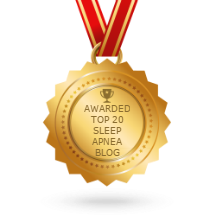Tag Archives: lack of sleep

Can Your Brain Actually ‘Eat Itself’ From Lack of Sleep?
The consequences of sleep deprivation go far beyond needing a cup of coffee to perk you up. Consistently skimping on sleep spurs the brain to begin gobbling neurons and synaptic connections, suggests a new animal study published in the Journal of Neuroscience.

Is Your Job To Blame For The Lack Of Sleep You’re Getting?
Are you getting enough sleep? If you’re not getting at least seven hours or more every day, the answer is likely “no,” according to the American Academy of Sleep Medicine and the Sleep Research Society.
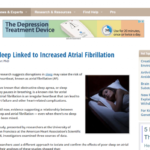
RESEARCH: Lack Of Sleep Could Raise Risk of Atrial Fibrillation
Preliminary research suggests disruptions in sleep may raise the risk of an irregular heartbeat, known as atrial fibrillation (AF).

Is Lack of Sleep A Reason For Hillary Clinton’s Health Issues?
Did lack of sleep contribute to Hillary Clinton getting pneumonia?
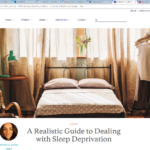
Sleep Deprivation And How To Handle It
Sleep debt is disorienting and can even be dangerous. Whether you suffer from general insomnia or juggle a grueling travel schedule, sleep deprivation is a serious health issue that affects millions. It can weaken one’s immune system, heighten emotional responses, and even alter gene expression. Sleeping pills can lead to potential overuse, or worse, abuse. Luckily, there are healthful alternatives that can ease the symptoms of sleep loss.

Should We Actually Be Sleeping Twice A Day?
Sleeping Once A Day? How about Twice?
This time, we’re all doing it wrong. Well, except for a handful of Spanish people that still enjoy a siesta after lunch.
Experts believe that the reason we’re all constantly whingeing about lack of sleep is because we should actually be doing it twice a day, for shorter bursts.
Did someone say siesta?
The idea that we should all be trying for a continuous eight hours of sleep at night is, experts argue, a recent invention, and our body clocks are far better suited to two shorter bursts of sleep each day.
In fact, so-called segmented, or bi-modal, sleeping used to be the norm, argue Dr Melinda Jackson, a psychologist who specialises in sleep disorders at RMIT University, and Siobhan Banks, sleep researcher at the University of South Australia.
‘Anthropologists have found evidence that during pre-industrial Europe, bi-modal sleeping was considered the norm,’ they explained in an article this week for the Conversation.
For example, in Charles Dickens’ Barnaby Rudge (published in 1840), he refers to the concept of a first and second sleep, writing:
“He knew this, even in the horror with which he started from his first sleep, and threw up the window to dispel it by the presence of some object, beyond the room, which had not been, as it were, the witness of his dream.”
People’s bedtime wasn’t determined by time of day, but by what they had to do and when.
‘Interestingly, the appearance of sleep maintenance insomnia in the literature in the late 19th century coincides with the period where accounts of split sleep start to disappear,’ Jackson and Banks go on to note.
To read the rest of this article, click here:
You can buy CPAP Machines, tubing and all of your CPAP supplies at CPAP America, 943 Kings Highway, Suite 503, West Deptford, NJ 08066. Feel free to contact us at 1-800-569-0167.
You can also reach us via email here.
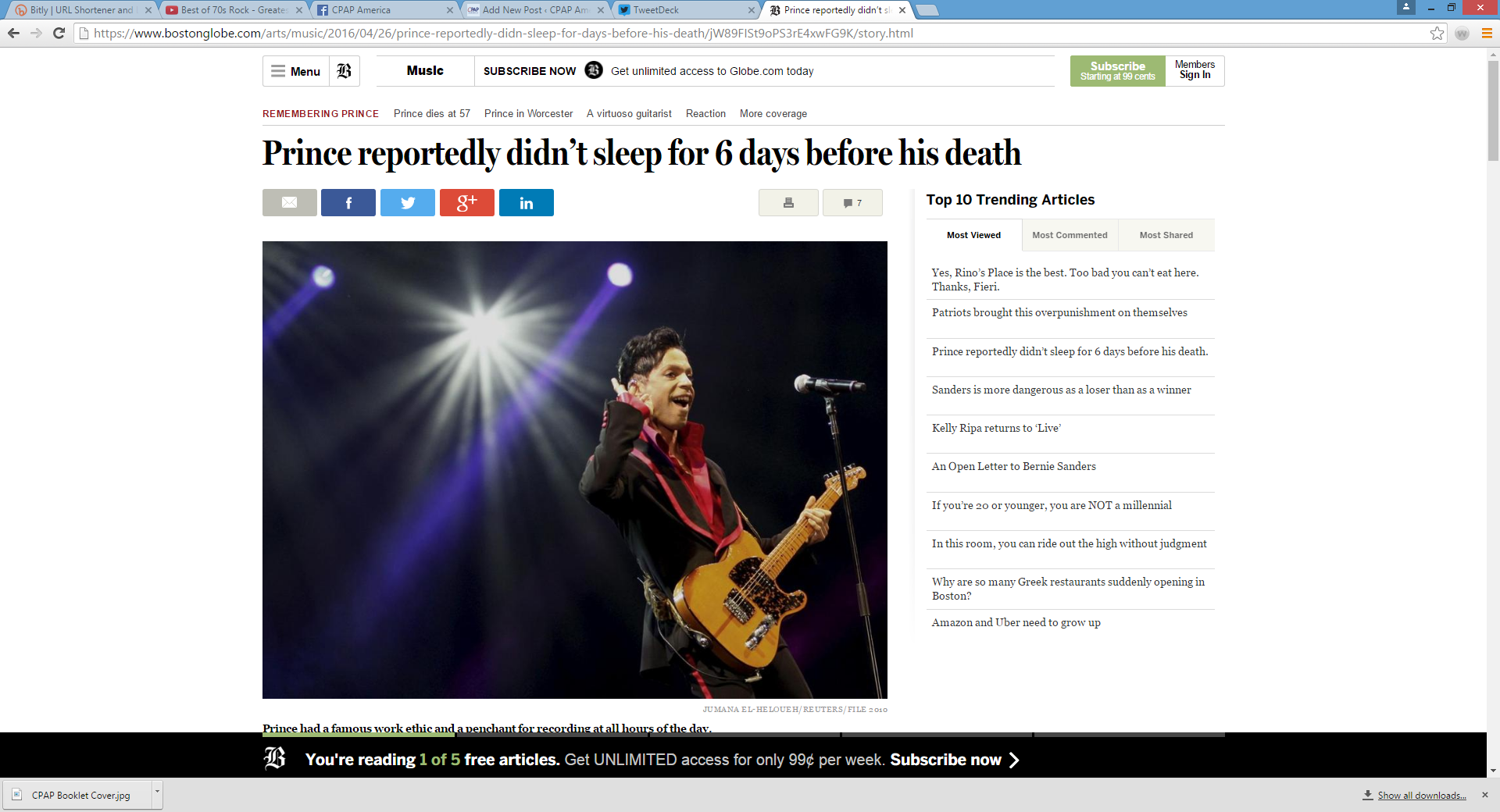
Prince: Did lack of sleep contribute to his death?
Was lack of sleep a factor in the death of Prince?
It’s been five days since the death of Prince, but the exact cause remains a mystery. A preliminary sheriff’s briefing discounted trauma and suicide, though the official autopsy report could take weeks before it becomes public. In the meantime, possible comments from Maurice Phillips, who is married to Prince’s sister, Tyka Nelson, are stoking speculation that sleep deprivation may have contributed to the musician’s death.
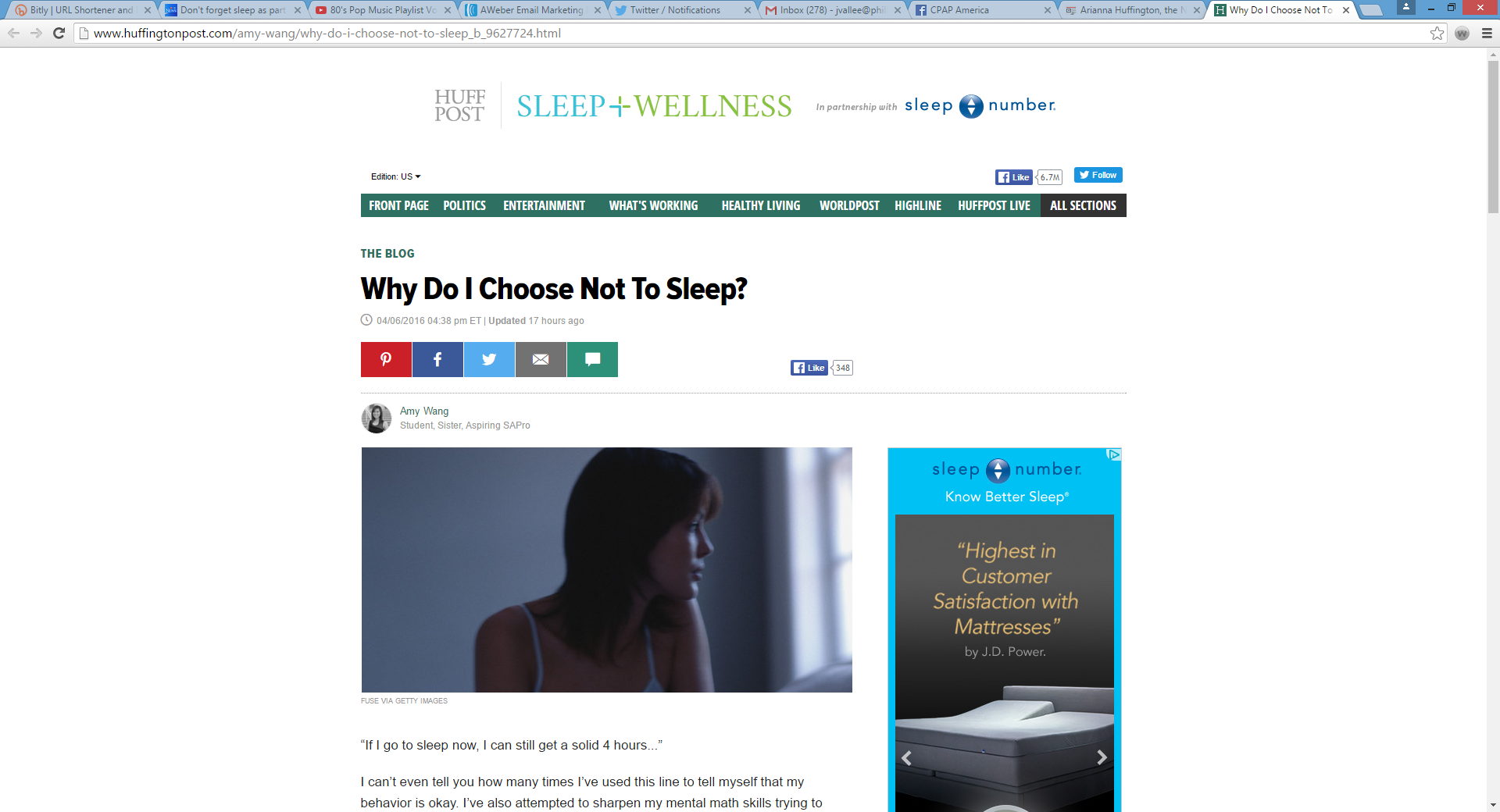
Why Don’t We Make Sleep A Priority?
“If I go to sleep now, I can still get a solid 4 hours…”
I can’t even tell you how many times I’ve used this line to tell myself that my behavior is okay. I’ve also attempted to sharpen my mental math skills trying to figure out the latest possible time I can go to sleep to get four hours of rest. It’s a minimum I’ve determined myself, a number of how many hours I believe I personally need to function. But I can never seem to get it right because I make these decisions when I’m already sleep-deprived, which leads me to poor choices and staying up until I only have four hours left.
So what happens? I wake up feeling sluggish.

Insomnia sufferers may have abnormal brain activity
To sleep, perchance to dream … and to keep your brain working: Scientists have long known about the importance of getting a good night’s sleep to improve memory, learning and mental health. But the underlying cause of primary insomnia — a chronic inability to sleep soundly that’s not associated with the use of stimulants, or medical disorders such as depression — has eluded researchers.
Now, a small study comparing healthy participants to patients who have primary insomnia has found that the people with insomnia have weakened neural connections to and from the thalamus, the region of the brain that regulates consciousness, sleep and alertness.
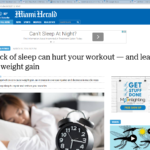
How sleep deprivation can effect your workout
Lack of sleep= poor workout?
Your fitness routine is in full swing two months into the year: You’re eating right and you’re exercising, but you’re not yet seeing the results you want from your workout.
What’s missing? It might be sleep.
So say an increasing number of studies that show sleep deprivation causing such negative outcomes as weight gain, an increase in overuse injuries, a decrease in muscle mass and a reduction in testosterone (which has a whole host of other negative effects, including low sex drive, depression and bone loss).
“You can have two people who are doing the exact same workout and eating the same good nutrition, but one is seeing huge progress and the other isn’t. A lot of the time, good sleep is the difference,” says Mansur Mendizabal, a personal trainer and kettlebell instructor in Washington.
“Sleep is the only time the body is fully recovering and rebuilding,” he says.
In other words, it’s not enough to take a day or two off from training and slouch on the couch and expect good results. It’s sleep — specifically deep sleep — that is the difference when it comes to such things as muscle recovery, mental acuity and reaction time, another important aspect of sports performance.
“It’s during the deep stages of sleep that all the tissues of the body repair,” says John Broussard, a sports medicine doctor in Washington. “But you have to get into all the stages of sleep in the proper sequence to get those restorative benefits.”
There are four parts of the sleep cycle: Stage 1 (near-awake), Stage 2 (onset of sleep), Stage 3 (deep and restorative sleep) and Stage 4 (deep REM or dream state), which occurs at about 90 minutes into each cycle.
To read the rest of this sleep related article, click here:
http://www.miamiherald.com/living/health-fitness/article66082812.html
You can buy CPAP Machines, tubing and all of your CPAP supplies at CPAP America, 707 Mantua Pike, West Deptford, NJ 08096. Feel free to contact us at 1-800-569-0167.
You can also reach us via email here.

